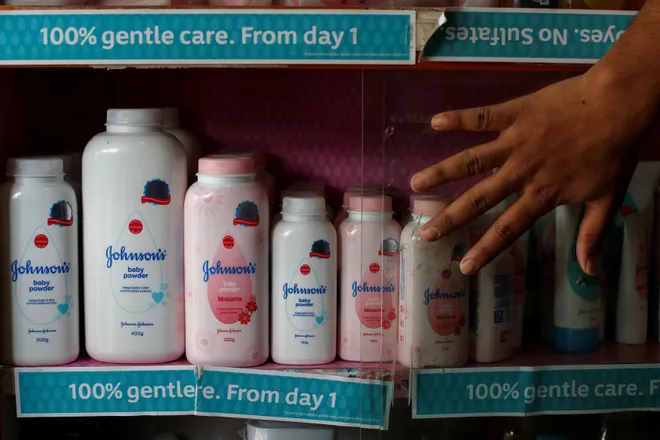Johnson & Johnson to pay $700 million to 42 states in talc baby powder lawsuit

Johnson & Johnson will pay $700 million to settle a lawsuit by dozens of states that accused the pharmaceutical industry giant of intentionally misleading customers about the safety of its talc-based baby powder, officials announced Tuesday.
J&J sold products with talc for more than 100 years before discontinuing them globally in 2023 after facing thousands of lawsuits. The coalition of 43 attorneys general found Johnson & Johnson failed to disclose that the talc sometimes contained asbestos, and that asbestos is harmful and can lead to cancer.
Johnson & Johnson baby powder is now largely made from corn starch rather than talc. The company did not admit guilt as part of the settlement.
“We have reached a landmark settlement with Johnson & Johnson ensuring that the company will abide by the law and take effective steps to protect consumers from potentially hazardous ingredients,” Texas Attorney General Ken Paxton said in a statement Tuesday. “I’m proud to lead this coalition of 43 attorneys general to stand up for consumers’ health and truth in marketing.”
Attorneys general for Texas, Florida and North Carolina led the multistate litigation, in which judicial approval of the settlement deal is still pending.
The talcum powder lawsuit was joined by Alabama, Alaska, Arizona, Arkansas, California, Colorado, Connecticut, Delaware, Washington D.C., Georgia, Hawaii, Idaho, Illinois, Indiana, Iowa, Kansas, Kentucky, Maine, Maryland, Massachusetts, Michigan, Minnesota, Montana, Nebraska, Nevada, New Hampshire, New Jersey, New York, North Dakota, Ohio, Oklahoma, Oregon, Rhode Island, South Dakota, Utah, Vermont, Virginia, Washington state, West Virginia and Wisconsin.
"This is a major advancement for consumer product safety," Florida Attorney General Ashley Moody wrote in a statement Tuesday.
Johnson & Johnson faces slew of other lawsuits
The payout announced Tuesday is the latest J&J has agreed to in a yearslong string of lawsuits alleging its products caused serious – sometimes deadly – illnesses.
A Chicago jury in April awarded $45 million to the family of a woman who died from mesothelioma, a cancer linked to asbestos exposure. Theresa Garcia’s family alleged her frequent use of J&J's talc-based products led to the fatal diagnosis.
In New Jersey, Johnson & Johnson was ordered to pay $186 million to four plaintiffs in a 2020 lawsuit alleging baby powder caused their cancer.
And earlier this month, an Oregon woman who said she developed mesothelioma from using J&J’s talc-based products was awarded $260 million in damages, WTVR reported.
Johnson & Johnson still faces tens of thousands of individual lawsuits alleging that talc-containing products led consumers to develop severe health issues, according to the U.S. Securities and Exchange Commission.
A class action suit that accuses the company of having hidden the dangers of talc products from shareholders is also pending.
Johnson & Johnson has made several attempts to resolve the cases by placing a subsidiary that it created to contain its talc-related liabilities into bankruptcy, Reuters reported, with as much as $11 billion earmarked for potential payments, but courts have not approved such efforts.
"The Company continues to pursue several paths to achieve a comprehensive and final resolution of the talc litigation," Erik Haas, Johnson & Johnson worldwide vice president of litigation, wrote in a statement Tuesday. "We will continue to address the claims of those who do not want to participate in our contemplated consensual bankruptcy resolution through litigation or settlement.”
Lawsuit:Johnson & Johnson marketed baby powder to Black women amid cancer concerns
Are talc-based products safe?
Talc is a naturally occurring mineral used in cosmetics and personal care products such as baby powder and blush, according to the Food and Drug Administration. It is used to absorb moisture or improve the feel of a product.
The mineral is sometimes found in mines with asbestos, which can lead to contamination. Inhalation of asbestos has been linked to cancer, the FDA warns. Questions about potential contamination have been raised since the 1970s.
Talc that contains asbestos is "generally accepted as being able to cause cancer if it is inhaled," the American Cancer Society said. But the link between asbestos-free talc and cancer is unclear. The FDA said researchers have suggested a potential connection between talc-based powders used in the genital area and development of ovarian cancer since the 1960s, but studies have not conclusively determined whether they are related.
Johnson & Johnson has denied its baby powder contains asbestos.
Disclaimer: The copyright of this article belongs to the original author. Reposting this article is solely for the purpose of information dissemination and does not constitute any investment advice. If there is any infringement, please contact us immediately. We will make corrections or deletions as necessary. Thank you.







